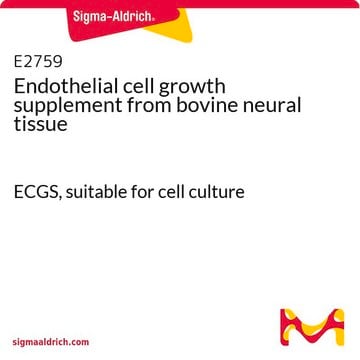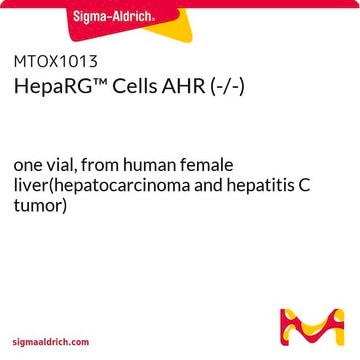ADD620C
HepaRG™ Maintenance and Metabolism Medium Supplement with Antibiotics
Sign Into View Organizational & Contract Pricing
All Photos(1)
About This Item
UNSPSC Code:
12352207
NACRES:
NA.71
Recommended Products
form
liquid
shipped in
dry ice
storage temp.
−20°C
General description
Biopredic′s HepaRG Maintenance and Metabolism Medium Supplement with Antibiotics can be used with all HepaRG cell lines. See user guide for detailed protocols.
HepaRG™ cells uniquely maintain significant levels of hepatic cell functions, being CYP450 inducible and support the complete hepatitis B virus (HBV) replicative cycle.
Application
HepaRG™ maintenance and metabolism medium supplement with antibiotics has been used to culture HepaRG cells:
- to study the interaction of hepatocytes and cholangiocytes when challenged with chlorpromazine (CPZ)
- to assess the validity of stable reference genes (RG) for gene expression using quantitative real-time polymerase chain reaction (RT-qPCR)
- as a supplement in basal hepatic cell culture medium to study the effects of cholestasis on liver connexins
Legal Information
Use of this product is subject to one or more license agreements.
HepaRG cells are patented and their use is strictly limited; consider the cells as a single use, disposable product that must be destroyed upon conclusion of a study or experiment. Propagating, reproducing, cloning, subcloning or any other use of the cells following the conclusion of a study is prohibited. Use of the cells to produce or manufacture commercial products for general sale or for use in the manufacture of products intended for general sale is prohibited. Transfer of the cells to anyone not employed within the same organization, whether for financial benefit or not, is prohibited. If you are unwilling to accept the terms of this LIMITED USE LICENSE, do not ORDER or use them and immediately return the cells for credit. Violators of this Limited Use Licesense will be prosecuted to the fullest extent of the law.
HepaRG cells are patented and their use is strictly limited; consider the cells as a single use, disposable product that must be destroyed upon conclusion of a study or experiment. Propagating, reproducing, cloning, subcloning or any other use of the cells following the conclusion of a study is prohibited. Use of the cells to produce or manufacture commercial products for general sale or for use in the manufacture of products intended for general sale is prohibited. Transfer of the cells to anyone not employed within the same organization, whether for financial benefit or not, is prohibited. If you are unwilling to accept the terms of this LIMITED USE LICENSE, do not ORDER or use them and immediately return the cells for credit. Violators of this Limited Use Licesense will be prosecuted to the fullest extent of the law.
HepaRG is a trademark of BioPredic International company
Signal Word
Warning
Hazard Statements
Precautionary Statements
Hazard Classifications
Repr. 2
Storage Class Code
10 - Combustible liquids
WGK
WGK 3
Flash Point(F)
Not applicable
Flash Point(C)
Not applicable
Certificates of Analysis (COA)
Search for Certificates of Analysis (COA) by entering the products Lot/Batch Number. Lot and Batch Numbers can be found on a product’s label following the words ‘Lot’ or ‘Batch’.
Already Own This Product?
Find documentation for the products that you have recently purchased in the Document Library.
Axelle Cooreman et al.
International journal of molecular sciences, 21(18) (2020-09-11)
Connexins are goal keepers of tissue homeostasis, including in the liver. As a result, they are frequently involved in disease. The current study was set up to investigate the effects of cholestatic disease on the production of connexin26, connexin32 and
Katie Morgan et al.
Biomedicine & pharmacotherapy = Biomedecine & pharmacotherapie, 111, 1408-1416 (2019-03-08)
Chlorpromazine (CPZ) is a neuroleptic drug and prototype compound used to study intrahepatic cholestasis. The exact mechanisms of CPZ induced cholestasis remain unclear. Rat hepatocytes, or a sandwich culture of rat and human hepatocytes, have been the most commonly used
Joanna Brzeszczyńska et al.
Cells, 9(3) (2020-04-05)
Gene expression analysis by quantitative real-time polymerase chain reaction (RT-qPCR) is routinely used in biomedical studies. The reproducibility and reliability of the data fundamentally depends on experimental design and data interpretation. Despite the wide application of this assay, there is
Anika Mann et al.
Human cell, 30(4), 267-278 (2017-05-21)
HepaRG cells are widely used as an in vitro model to assess drug-induced hepatotoxicity. However, only few studies exist so far regarding their suitability to detect the effects of drugs requiring a preceding activation via the cytochrome P450 (CYP) system.
Yi Ni et al.
Methods in molecular biology (Clifton, N.J.), 1540, 15-25 (2016-12-16)
Investigations of virus-host interactions rely on suitable in vitro cell culture systems that efficiently support virus infection. Such systems should ideally provide conditions that resemble those of natural host cells, e.g., the cell-type specific signaling and metabolic pathways. For HBV
Our team of scientists has experience in all areas of research including Life Science, Material Science, Chemical Synthesis, Chromatography, Analytical and many others.
Contact Technical Service







